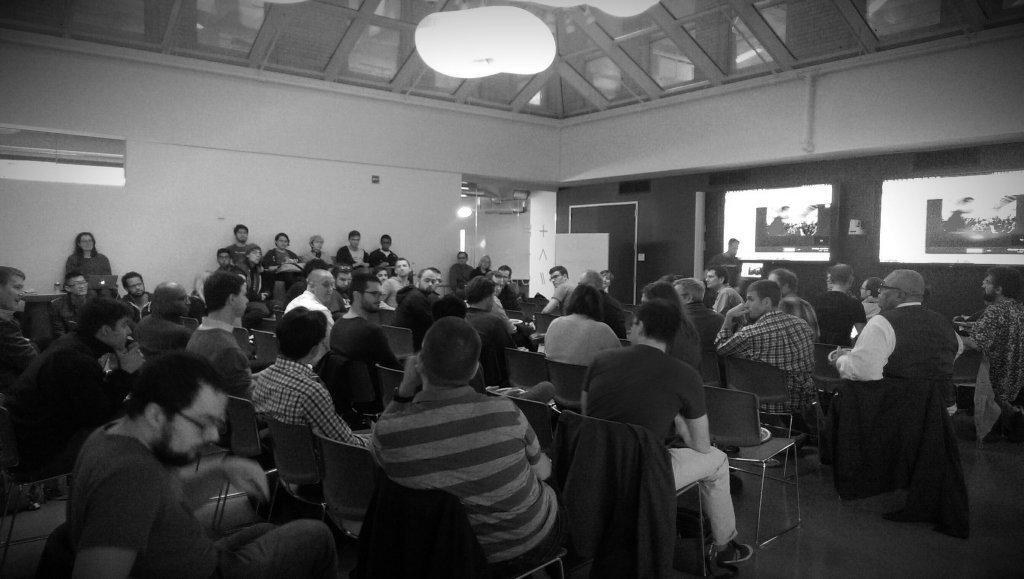#200 Celebration: A place to learn and grow civic tech leadership
Published on Apr 12, 2016 by Christopher Whitaker

If it's Tuesday, it must be #chihacknight! Photo by Tom Schenk Jr.
Editor’s note: As part of our 200th event celebration, we have invited folks to share their Chi Hack Night stories, projects, learnings and congratulations. This is one of them!
In both his State of the Union and his remarks at #SXSW, Chicagoan and President Barack Obama stated that the most important office in a democracy was that of the Office of the Citizen. At Chi Hack Night, we’re privileged to be part of an active movement of people getting engaged in their communities through the use of technology.
"The most important office in a democracy is the office of citizen." —@POTUS to students @UChicagoLaw #SCOTUS
— The White House (@WhiteHouse) April 7, 2016
One of the things that I can never get over is how many people actually show up at Chi Hack Night. It’s been humbling to watch the event grow from just a handful of people in a conference room into this huge event that seems to fill up whatever space we can find for it. With attendance exceeding one hundred people each week, there’s no denying that there’s a lot of energy and citizen engagement at Chi Hack Night.
Umm - I think we need a bigger room #chihacknight #cfabrigade cc @1871Chicago pic.twitter.com/BwwzJPdDIC
— Christopher Whitaker (@CivicWhitaker) July 8, 2014
Chi Hack Night in the IMSA room at 1871
Packed house tonight! #chihacknight pic.twitter.com/C232McwP5K
— Chi Hack Night (@chihacknight) July 29, 2015
What happened when we actually got a bigger room
It’s not just people in the number of people in the audience that I’d like to point out. It’s also the sheer number of people who have volunteered to be Breakout Group leaders — twenty in total.
That’s not an insignificant number of civic technology leaders in the room all at the same time. And that’s one of the bigger advantages of Chi Hack Night and events like it is that it’s a great place to learn about civics, technology, and civic tech.
#2 Design for people who skim #chihacknight #civictech http://t.co/gRVK1DSc2A pic.twitter.com/5XBt5FiYVN
— Smart Chicago (@SmartChicago) July 22, 2015
Cathy Deng giving a short class at Chi Hack Night
The merger of skills
When I first started going to the OpenGov Chicago Meetup (and later OpenGov Hack Night which would end up evolving into Chi Hack Night), I had zero technology experience beyond operating my own computer. As a I started attending hack night week after week, I began to gain a better understanding of the technology side to the point where I’m more technology savvy than the average person. I’ve also noticed that people who come into hack night from the tech side end up learning more and more about civic issues to the point where they know more about how government services work and the issues surrounding government than the average person. On both sides, people who have picked up the lead on a project or breakout group also pick up project management and leadership experience.
This merger of skills creates civic technology leaders by fostering the ability to listen and understand the complex challenges faced by those delivering and receiving government services — and then being able to see how technology can factor into the solution.
Public servants must deal with complex challenges in a high stakes environment where resources are increasingly scarce in a system that doesn’t allow for failure or reward experimentation. When combined with the challenge of modernizing the technology that is used to deliver services, these problem sets only become more complex and difficult. Put another way, this shit is hard.
"Opengrid is the future" - @tomschenkjr @ChicagoCDO Great presentation at #chihacknight. Check it out at opengrid.io pic.twitter.com/LR25MGW7Nh
— Kevin Wei (@Wei_Too_Good) January 20, 2016
The high level of difficulty of these problem sets is exactly why we need places to learn. Part of the success of Chi Hack Night and hack nights like is that they are primarily learning environments.
Even after two hundred hack nights, seven years of Code for America, two new federal civic tech agencies, countless tweets, blogs, and talks about civic technology — civic tech is still a new as a field. Nobody should come to a civic tech event and feel they aren’t ‘cool’ or ‘techy’ enough to participate. Everyone started from zero at one point or another. Hack nights are a great place to learn exactly because it’s bringing in people with different skill sets and background who learn from each other.
The fact that hack nights produce civic tech leaders shouldn’t be discounted. As time has gone on, people who started out as volunteer participants at hack nights have gone on to be hired by governments, non-profits, or started their own companies.
200 Lessons Learned
Chi Hack Night has also helped to create a deep knowledge base of lessons learned. We have been very lucky in getting a wide variety of awesome speakers and trainers. And we have several learning breakout groups specifically designed to help people improve their skills.
Starting this month, @muckrakery will be running a FOIA workshop at #chihacknight every other week. Free the info! https://t.co/vKeXjhgJy2
— Chi Hack Night (@chihacknight) February 12, 2016
I was able to record many of these lessons learned thanks to the support of the Smart Chicago Collaborative. (I’ve created an Anthology here.)
Now, Thanks to the support of Microsoft’s Civic Tech Chicago office — Chi Hack Night’s been able to hire Scrappers Film Group to record presentations at Chi Hack Night in high definition on Chi Hack Night’s YouTube channel. For example, here’s Illinois CIO Hardik Bhatt talking about the future of technology in state government.
These lessons don’t just benefit attendees of Chi Hack Night, but they also filter out to the larger network of civic hack nights through the Code for America Brigade program.
Here’s Derek Eder at the Code for America Summit talking about lessons learned from running Chi Hack Night:
Still Learning
The great thing about Chi Hack Night is that we’re still learning and growing. With generous support from a wide range of sponsors and large open leadership council, Chi Hack Night is in a good position to continue being a place to build, share & learn about civic tech.
About the author
Christopher Whitaker
Christopher Whitaker serves as the Brigade Program Manager for Code for America. Previously, Whitaker worked at the Illinois Department of Employment Security and served with the U.S. Army in Iraq as a mechanized infantryman.
